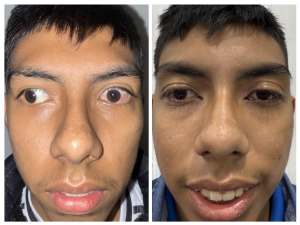As a pediatric ophthalmologist and eye trauma surgeon focusing on high-risk populations in the US, I will be volunteering with VER International on a high-impact surgical project to perform 60 pediatric strabismus surgeries in just five days in Sullana, Peru. Dates are Aug 27-Sept 7, 2025.
Strabismus—eye misalignment—is far more than a cosmetic issue. It disrupts binocular vision development, leads to permanent vision loss of one eye if not treated in early childhood, and impairs depth perception, leading to social stigmatization and lifelong limitations in education, employment, and self-esteem if left uncorrected.
In many resource-limited regions, children with strabismus are marginalized and often incorrectly perceived as intellectually disabled. Surgery not only realigns the eyes, but it realigns the trajectory of a child’s life and brain development. Outcomes often include improved visual function, restored binocular fusion, and a dramatic increase in social confidence. Children who were previously withdrawn due to teasing or poor visual coordination return to school, engage in play, and communicate with eye contact—sometimes for the first time in their lives.
I am honored to bring my surgical skills and deep commitment to pediatric vision care to this mission, and grateful for consideration of airfare support to make this life-changing service possible.
60 children pre-selected by local ophthalmologists from the Piura region of northern Peru. This population is isolated from pediatric eye care, and particularly pediatric eye surgery access. Children would have to fly to Lima in order to access this care, and that is impossible for the vast majority of families in this region. The medical infrastructure exists, and we bring the subspecialty expertise, in true partnership with the local Ministry of Health.
Through this work, we are not only changing how a child sees the world, but how the world sees the child.
This project exemplifies efficient, sustainable care delivery: 60 pediatric eye surgeries in just 5 days represents not only medical precision and coordination, but the multiplication of long-term impact. Each child we help carries the benefit for a lifetime. For many, it is the first—and only—opportunity to access specialty eye care.
This will be my 5th international pediatric eye surgery project, and I have already incorporated principles of equitable patient care in my practice in the US-- from nuanced and culturally aware communication in Spanish, to simplified post-op care. I explain to my patients in South America that I offer the exact same quality of care to them as I do in the US, because I believe resource-conscious care should be universal, and the "care" comes mostly in the way that I connect with patients and families, and I am in control of how equitable that is.
I also keep in contact with the families over time, via WhatsApp, if the parents choose to do so, and I am able to provide limited and safe remote guidance and outcomes monitoring.










As a team of three pediatric eye surgeons, two anesthesiologists, three OR assistants/nurses, and three pre and post op nurses, we were able to complete 53 pediatric eye alignment surgeries in 5 days. These are infants, preschoolers, school kids, and teens who will all have more aligned eyes -- allowing for confidence, eye contact, opportunities in life, and better vision development.